I have a dual role as superintendent and consultant uItrasonographer of the Obstetrics and Gynaecology Ultrasound Department at The West Middlesex University Hospital, which has recently merged with the Chelsea and Westminster Hospital to become a foundation trust.
The ultrasound department consists of nine ultrasound rooms and I manage 11 sonographers and two student sonographers. The department sees approximately 120 obstetrics and gynaecology patients a day.
My role is currently fourfold: clinical expert, educator, professional leader, and researcher. My passion is clinical work and I spend 50% of my time scanning patients. During the week, I rotate around the ultrasound department so that I work in every speciality each week, which includes obstetrics, gynaecology, gynae oncology and early pregnancy.
My aim is to always deliver a high quality ultrasound service and excellent patient care. I regularly provide specialist knowledge in obstetrics, gynaecology and early pregnancy ultrasound to the doctors working alongside me in the various clinics. As consultant, I am seen as the clinical expert in my sonographer-led department and I regularly have to run between clinics to give second opinions and carry out the complex scans.
My journey to becoming an accredited SCoR consultant sonographer began with supervising, training and mentoring student sonographers, which I still do regularly. I enjoy teaching a great deal, so I facilitated a learning culture within the ultrasound department, by teaching and lecturing to my team of sonographers on a weekly basis, during a dedicated one hour education meeting. Initially, I gave lectures, reviewed journal articles, discussed recent audit results, and highlighted interesting patient cases. Over time this became a collaborative learning experience, with other staff and students leading on topics each week.
Mentoring students meant I formed a good working relationship with the lecturers from City University of London, who used to visit the department as my students’ clinical assessors. They soon became aware of my love for teaching and this led to me being invited to City University of London as a guest lecturer. Over the past 14 years I have lectured on obstetrics, gynaecology and subfertility ultrasound.
Six years ago, I wanted to increase my professional development and extend my skills. I started to work in a neighbouring tertiary referral fetal medicine department for one day a week. My time spent in fetal medicine was incredibly rewarding and I gained experience in fetal medicine scanning, fetal genetics, management of fetal anomalies, and counselling skills. After a year, the fetal medicine consultants suggested that some of the fetal medicine patients could return to the West Middlesex University Hospital for their follow-up scans with me, as a specialist sonographer in fetal medicine.
Alongside this, I wanted to improve clinical practice by increasing the antenatal detection rate of vasa praevia, heart anomalies and placental insufficiency. My team of sonographers enjoy aspiring to high detection rates, accurate diagnoses and high quality patient care.
Scanning fetal medicine cases meant I was now detecting very rare conditions. I published a case study on the antenatal ultrasound detection of bilateral cataracts and, shortly after its publication, I was asked to present the case study at the British Medical Ultrasound Society’s annual scientific meeting. I was soon invited to peer-review articles for potential publication in ultrasound journals. A ripple effect had taken hold and an increasing number of opportunities opened up.
It was when I became a member of the SCoR’s Ultrasound Advisory Group in 2015 that I began to review and comment on new national ultrasound guidelines and screening pathways. I now attend focus groups and workshops, which involve improving ultrasound services and the patient experience. I have achieved immense professional fulfilment by extending my role and engaging with these important developments.
In 2016 I realised that I met all four domains of consultant practice, so I decided to apply for consultant accreditation at the Society of Radiographers. It is quite a rigorous application process, so I was delighted when my accreditation was approved. I need to maintain my accreditation and there is an increasing expectation from the Society of Radiographers for consultants to embark upon doctoral studies. In 2017 I began a professional doctorate and I am now in my second year. So far it has been an incredible learning experience and, despite the long hours, I am enjoying it a great deal.
My enthusiasm for ultrasonography never wanes. My consultant status means I now work between the hospital, professional bodies and academic institutes, which allows me to network with many ultrasound professionals. This enables me to advise, educate, facilitate learning and develop sonographers locally and nationally.
Most importantly, I genuinely believe my hard-working and loyal team of sonographers have helped me transform the ultrasound department into a centre of excellence for patients and a place in which we’re very proud to work.
